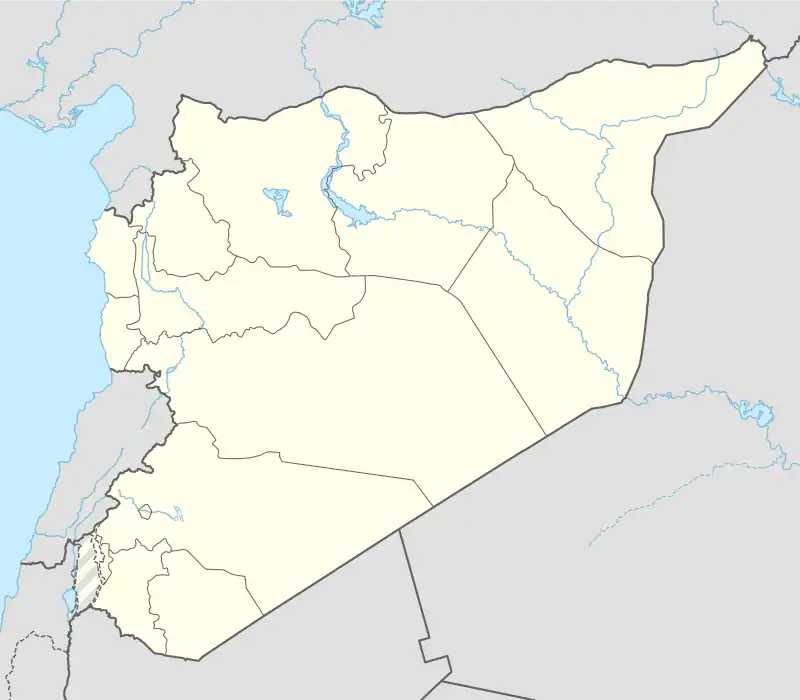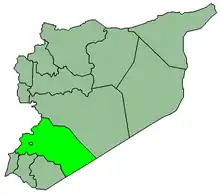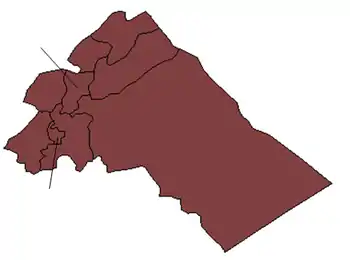Jubb'adin
ܓܦܥܘܕ - גפעוד جبعدين | |
|---|---|
Village | |
 Jubb'adin | |
| Coordinates: 33°49′35″N 36°30′33″E / 33.826382°N 36.509215°E | |
| Country | |
| Governorate | Rif Dimashq |
| District | al-Qutayfah |
| Subdistrict | Maaloula |
| Population (2004 census)[1] | |
| • Total | 3,778 |
| Time zone | UTC+2 (EET) |
| • Summer (DST) | UTC+3 (EEST) |
| Area code | 11 |
Jubb'adin (Western Neo-Aramaic: ܓܦܥܘܕ - גפעוד, romanized: Ġuppaҁōḏ,[2] Arabic: جبعدين)[3] is a village in southern Syria, administratively part of the Rif Dimashq Governorate, located northeast of Damascus in the Qalamoun Mountains. Nearby localities include Saidnaya and Rankous to the southwest, Yabroud and Maaloula to the northeast, and Assal al-Ward to the northwest.
According to the Syria Central Bureau of Statistics, Jubb'adin had a population of 3,778 in the 2004 census.[1] However, that number has likely decreased during the Syrian Civil War as a result of combat casualties and emigration. The village's inhabitants are all Sunni Muslims by religion and of Aramean (Syriac) descent.[4][5][6][7][8][9][10]
The village is among the three last remaining villages where Western Neo-Aramaic is still spoken. Most of the younger people in the village are bilingual and speak both Western Neo-Aramaic and Syrian Arabic fluently. Jubb'adin is the main source of modern poetry written in the Western Neo-Aramaic language, thanks to its many poets. The environment is colder than in most other Syrian cities and villages due to its altitude.[11]
The main mosque in the village is called Jemʿa rāb or 'the large mosque' in Western Neo-Aramaic.
Etymology
The etymology of the village's name remains controversial. It is believed to be composed of two parts. The first part is gubbā[12] (Western Neo-Aramaic: ܓܘܒܒܐ), which is Aramaic for 'well' and second part is ҁōḏ (Western Neo-Aramaic: ܥܘܕ), which could mean 'Eden', making the name to mean 'the well of Eden'.
Another possibility is that it is a reference to Audis who founded Audianism, a sect of Christians in the 4th-century who were founded in Syria and spread into Scythia, in which case the full meaning would be 'the well of Audis'. Another theory, though less likely, is that the word is a reference to the people of ‘Ad, who are mentioned in the Quran.
Notable individuals
Famous individuals from the village include the Syrian actor Jalal Al-Taweel.
References
- 1 2 General Census of Population and Housing 2004. Syria Central Bureau of Statistics (CBS). Rif Dimashq Governorate.(in Arabic)
- ↑ https://books.google.de/books?id=xLXkDwAAQBAJ&pg=PA2&dq=Ġuppa&hl=de&newbks=1&newbks_redir=0&source=gb_mobile_search&sa=X&ved=2ahUKEwj7ouzu__iCAxVAgP0HHUg4AVsQ6AF6BAgHEAM#v=onepage&q=Ġuppa&f=false, "Its Aramaic name is ġuppaҁōḏ, which is how its natives refer to it, while the word Jubaadin is the Arabized form of its name."
- ↑ AntonSamuel (11 September 2017). "English: Maaloula 7". Commons.wikimedia.org. Retrieved 3 December 2017.
- ↑ https://www.aymennjawad.org/2019/05/jubbadin-in-qalamoun-interviewname
- ↑ اثرنا في الايقليم السوري (in Arabic). 1960. p. 56.
السريان في معلولا وجبعدين ولا يزال الأهلون فيها يتكلمون (The Syriacs in Maaloula and Jubb'adin still speak their language.…)
- ↑ Western Neo-Aramaic The Dialect of Jubaadin (in English and Arabic). Cambridge Scholars Publishing. p. 2.
Jubaadinis are very proud of their language and their Aramean identity and they have no trouble at all balancing their religious and ethnic identities.…
- ↑ ”…The city of Jubaadin in Syria, which is close to Maaloula, is inhabited by Aramaic-speaking people who are Syriac Arameans…“, translated quote from the Arabic book (Atlas of Religions) معلولا السريان
- ↑ The Semitic Heritage of Northwest Syria, p. 271
- ↑ “…Maaloula Syriacs have maintained their Syriac identity since ancient times, and there is ample evidence of their Syriac heritage, especially in Maaloula, Ain Tineh, Bakhah, and Jubaadin…“, translated quote from the book إلياس أنطون نصر الله في معلولا, p. 45
- ↑ "Hilfe für das Aramäerdorf Maaloula e.V. | an aid project in Syria".
- ↑ Amar, Joseph (12 October 2012). "The Loss of Syria". Commonwealmagazine.org. Retrieved 22 December 2012.
- ↑ https://books.google.de/books?id=Sux5DwAAQBAJ&pg=PA259&dq=neuwestaramäisch+brunnen&hl=de&newbks=1&newbks_redir=0&source=gb_mobile_search&sa=X&ved=2ahUKEwiz7ub29_iCAxX7g_0HHbjeBKMQ6AF6BAgHEAM#v=onepage&q=neuwestaramäisch%20brunnen&f=false, "…gubbā "Brunnen" 204…"
External links
- Samples of spoken Jubb'adin Aramaic at the Semitisches Tonarchiv (Semitic Audio Archive)

